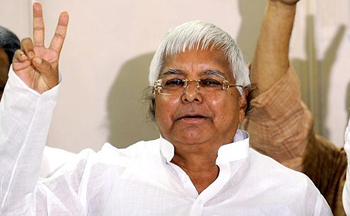Patna, Nov 8: Notwithstanding a string of losses that began with the defeat in the 2005 assembly polls when his party was ousted from power after 15 years and a court ruling, which will keep him out of electoral fray for six years, RJD boss Lalu Prasad has made a resounding comeback on Bihar's political stage.

The once seemingly invincible RJD, with its massive Muslim-OBC votebank, was not even eligible for the Leader of Opposition's post.
If the 2005 polls marked the exit of the Lalu-Rabri duo from the hot seat, 2010 debacle appeared to have exacerbated the process of RJD's marginalisation in state politics.
Lalu's conviction in a fodder scam case in 2013 came as a personal blow to him as it led to his immediate disqualification from the Lok Sabha and a ban from contesting an election at least for six years.
The 2014 Lok Sabha election was a crucial test for the backward class leader which he was to lead as a non-playing captain for the first time.
The results came as another jolt to RJD and Lalu, with the party managing to win only four of the state's 40 seats.
The successive defeats, however, carried seeds for a future reunion with friend-turned-foe Nitish Kumar, whose JD(U) had also been humiliated in the 2014 election, managing to win just two seats after parting ways with 17-year-old ally BJP in June 2013 over Narendra Modi's anointment as the party's campaign spearhead for last year's LS polls.
Acutely aware of Prime Minister Narendra Modi's personal charisma and BJP's growing popularity in the state, they began cosying up to each other after the Lok Sabha debacle.
With Samajwadi Party chief Mulayam Singh Yadav playing the role of a peacemaker, the two backward class heavyweights resolved their differences and decided to contest the 2015 Bihar polls in tandem.
Lalu, the wily practitioner of realpolitik, after initial reluctance, agreed to accepting Nitish Kumar as the grand alliance's chief ministerial candidate.
With he himself not eligible to contest elections, his wife Rabri Devi unwilling to return to the hurly burly of politics, and sons Tejaswi and Tej Pratap too young to handle the pressure that comes with the hot seat, Lalu declared Nitish Kumar will be the Chief Minister even if RJD won more seat than JD(U).
When RSS chief Mohan Bhagwat suggested a review of the reservation policy in an interview to Sangh organs Organiser and Panchjanya, Lalu, one of the most enduring mascots of post-Mandal politics, was quick to pounce on it and raise an alarm about a move by the Narendra Modi government to scrap quotas.
He repeated the charge, rally after election rally, and Modi's counteroffensive about the grand alliance favouring a dilution of quotas for dalits, tribals and OBCs to give five per cent reservation to Muslims failed to cut much ice with the electorate.
Lalu promptly declared the poll as 'Mandal Raj Part II' and a fight between the 'backwards and forwards', ensuring a rapid polarisation along caste lines, something which had kept RJD in power for 15 years in the politically volatile state.
While there was an apparent consolidation of backward class and Muslim voters in grand alliance's favour, the beef talk by the leaders of the NDA, particularly BJP, including Prime Minister Narendra Modi, failed to bring about a consolidation of Hindu votes in the favour of the centre's ruling alliance.
Of the 192 seats in the 243-member state assembly trends from where are available so far, Lalu's RJD is leading the table with 55 seats and JD(U) 52. BJP was leading in 53 seats and its allies LJP (6), Rashtriya Lok Samata Party and Hindustani Awam Morcha (three each).
Like the Lok Sabha polls in which his daughter Misa Bharti lost to his former protege Ram Kripal Yadav of BJP, his two sons Tejaswi and Tej Pratap are trailing from Raghopur and Mahua in Vaishali district.
Personal losses notwithstanding, Lalu is set to become the king maker in Bihar, if not the king.






Comments
Add new comment